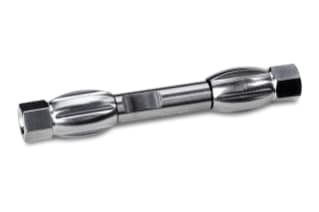
|
Chemistry |
C8 |
|
Separation Mode |
Reversed Phase |
|
Particle Substrate |
Hybrid |
|
pH Range Min |
1 pH |
|
pH Range Max |
12 pH |
|
Maximum Pressure |
6000 psi (415 Bar) |
|
Endcapped |
Yes |
|
Bonding Technology |
MS C8 |
|
Silanol Activity |
Low |
|
Particle Shape |
Spherical |
|
Particle Size |
2.5 µm |
|
Endfitting Type |
Waters |
|
Pore Size |
125 Å |
|
Format |
Column |
|
Surface Area |
175 |
|
System |
HPLC |
|
USP Classification |
L7 |
|
Inner Diameter |
4.6 mm |
|
Length |
50 mm |
|
Carbon Load |
12 % |
|
UNSPSC |
41115709 |
|
Brand |
XTerra |
|
Product Type |
Columns |
|
Units per Package |
1 pk |

XTerra MS C8 Column, 125Å, 2.5 µm, 4.6 mm X 50 mm, 1/pk
The general-purpose, hybrid-based, reversed-phase C8 columns known as XTerra MS C8 columns are made to work with mass spectrometry applications. Comparing these first-generation columns to a silica-based column, they offer improved pH stability. To retain the chemical make-up and purity of the hybrid particle, the XTerra MS C8 column is created with ultrapure reagents.
The XTerra MS C8 Column is manufactured, like all other Waters columns, in cutting-edge Waters facilities where each stage of production and packing is rigorously watched and completed within precise tolerances. To ensure that you receive dependable lab equipment of the highest caliber, each column is carefully inspected. For your peace of mind regarding the need for quality control, each column is given with Certificates of Batch Analysis and Column Efficiency.
The XTerra MS C8 Column has clear peak shapes, good sensitivity, and large peak capacities and was created primarily for Mass Spectrometry (MS) applications. Along with the column's capacity to deliver maximum throughput with great resolution and little column bleed, these features are highlighted.
The XTerra Columns stand out due to the fact that they are created using Waters Hybrid Particle Technology and include both organic (silica) and inorganic (other materials), offering a potent combination of both advantages. This hybrid technology enables the XTerra MS C8 column to provide excellent separation efficiency and higher pH stability over a wide pH range when compared to more conventional silica-based reversed-phase packing materials (1 - 12).
Our website lists a number of products that are appropriate for the XTerra MS C8 Column, including prep guards, vials, and elution plates. On the website, you can shop for lab equipment and get in touch with us if you have any questions.
You should also review LCMS Certified Clear Glass 12 x 32 mm Screw Neck Vial, with Cap and Preslit PTFE/Silicone Septum, 2 mL Volume, 100/pk; Each and every Waters LCMS Certified vial is made using strictly regulated manufacturing and handling techniques. They are examined using mass spectrometers, and a certificate of analysis displaying the reference and vial scan for the production batch is supplied with them.
What Are The Operating Restrictions For The XTerra MS C8 Column?
The XTerra MS C8 Column can function in a pH range of 1 to 12 and up to 6000 psi (415 bar) of pressure. It is strongly advised against performing analyses outside of the XTerra MS C8 Column's limits or in close proximity to them for an extended period of time because the lab apparatus will deteriorate, resulting in decreased performance and lifespan.